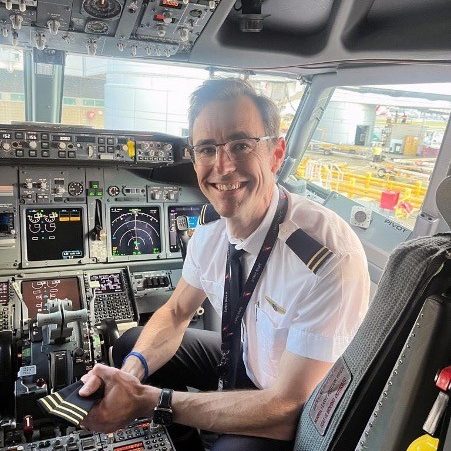Alumni Profile - Dr Jeremy Robertson
Explore the journey of UNSW Aviation graduate Dr Jeremy Robertson, whose determination and love for flying saw him return to the skies after a life-changing diagnosis of type 1 diabetes.

As we celebrate 30 years of Aviation at UNSW, we look back to the first cohort of graduates, which included Jeremy Robertson who graduated with his wings in 1998. Jeremy was also our very special keynote speaker at our most recent Wings Night in December 2024, where his story of never giving up on his passion for flying inspired our students.
Jeremy first joined Qantas as a pilot in 2001 but was diagnosed with Type 1 Diabetes in 2010. This is when the ‘music stopped’ for Jeremy. He lost his aviation medical clearance to fly. Instead of being defeated, Jeremy chose to pursue his passion a different way. He studied medicine with a focus on aviation. He was eventually able to get a clearance to fly small aircraft and for years, maintained his blood sugar levels. After three years of reviewing these records, CASA changed their policies, and Jeremy finally regained his full medical clearance to fly in 2020. Earlier this year, Jeremy completed his re-training as a Boeing 737 First Officer – some 14 years later. Read more about what studying Flying at UNSW Aviation meant for Jeremy.
What appealed to you about UNSW and your degree?
After completing my PPL training whilst in high school, I came to Sydney looking at an engineering degree to accompany my flight training. My careers advisor actually gave me a brochure on the UNSW Aviation Flying program and it was the exact mix of a university degree and flight training I wanted. Any other aviation programs available were just a generic science degree with flight training tacked onto it. The subjects at UNSW Aviation were actually tailored towards the industry with a diverse range of knowledge taught. That was what drew me to aviation in the first instance, the complexity, the interconnection of a variety of problems, and the ways in which to solve them.
What is the most valuable thing you took away from your time at UNSW?
The Flying program was a great mix of being on campus where shoes were optional, and going out to the FOU at Bankstown dressed smartly in your uniform. The friends I made during my time at UNSW I am still in touch with today, and include some of the current FOU staff members.
The calibre of flight training at the school built a reputation in the industry. It gives weight to my qualification when I tell people I completed my flight training at UNSW.
Where has your career taken you?
After I graduated from UNSW I worked for the university as a flight instructor. I was grateful for the opportunity as obtaining your first job in the industry is often the most challenging. I then spent a year and a half as a scenic and charter pilot in the Kimberley before being accepted into Qantas. I spent four years as a second officer on the 747-400 and then moved into a first officer role in the 767. Whist I was working on the 767 I was able to get involved in the flight technical side and was trained as a maintenance test pilot. During this time, I also studied part time and completed a Masters of Aerospace Engineering with a thesis on thrust modelling and visual flight data acquisition for the Jabiru J400.
In 2010 I was diagnosed with Type 1 diabetes which meant I lost my aviation medical certificate and was no longer able to fly commercially, so I decided to go back to university and study medicine. Given my aviation background I now work as a Designated Aviation Medical Examiner (DAME) and am undertaking specialty training in aerospace medicine.
After a 3-year submission process with CASA, in May 2020 I became the first person in Australia treated with insulin to attain a Class 1 Medical certificate. Now, in addition to my medical work I have recently commenced working part time as a flying instructor.
What innovations do you think the industry needs?
From an aviation medicine point of view the current three tier system of medical standards needs to be reviewed and expanded in order to be more appropriate to the wide variety of flying, from recreational up to commercial air transport, that occurs here in Australia.
What would your advice be for those currently studying or considering the study of Aviation at UNSW?
Completing your education at UNSW doesn’t only give you high quality flight training but also a deeper level of industry knowledge that just doing your pilot training cannot give you. The current environment and my 25 years in the industry has proven that you need to have a fall back during the down turns. Completing my flying training with UNSW gave me a tertiary qualification that allowed me a much easier path into postgraduate study when I lost my medical.
You can watch Jeremy’s story on Youtube here:
